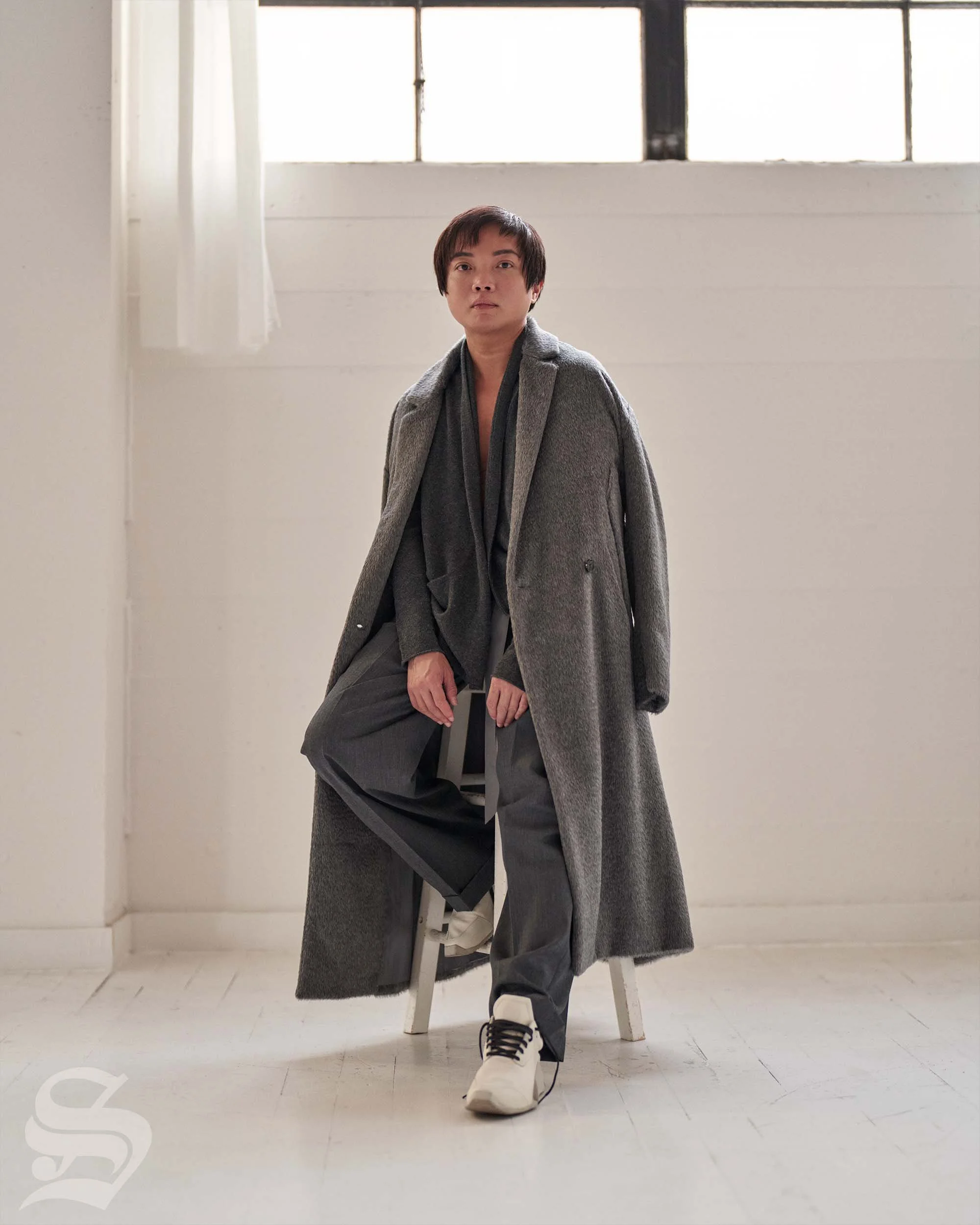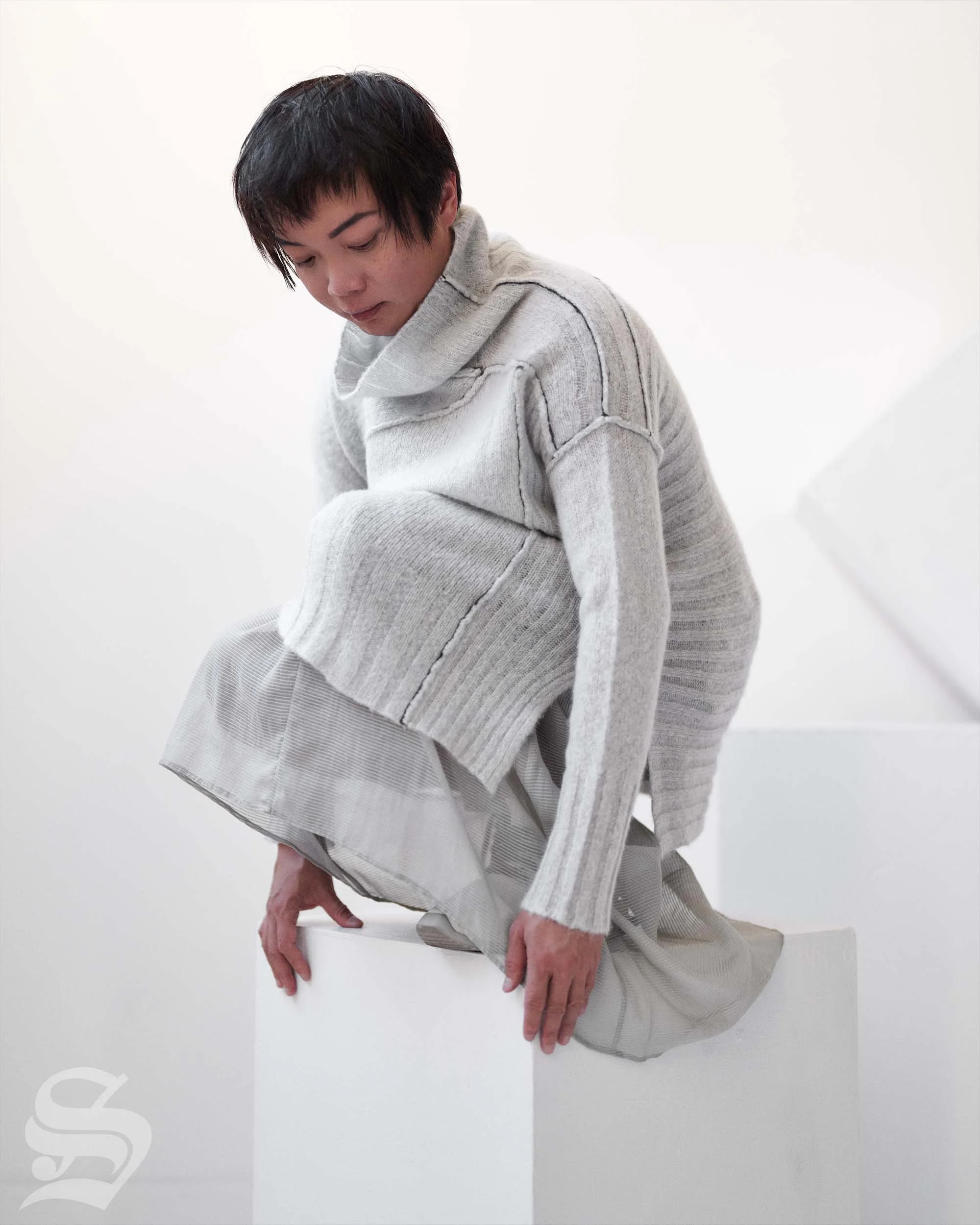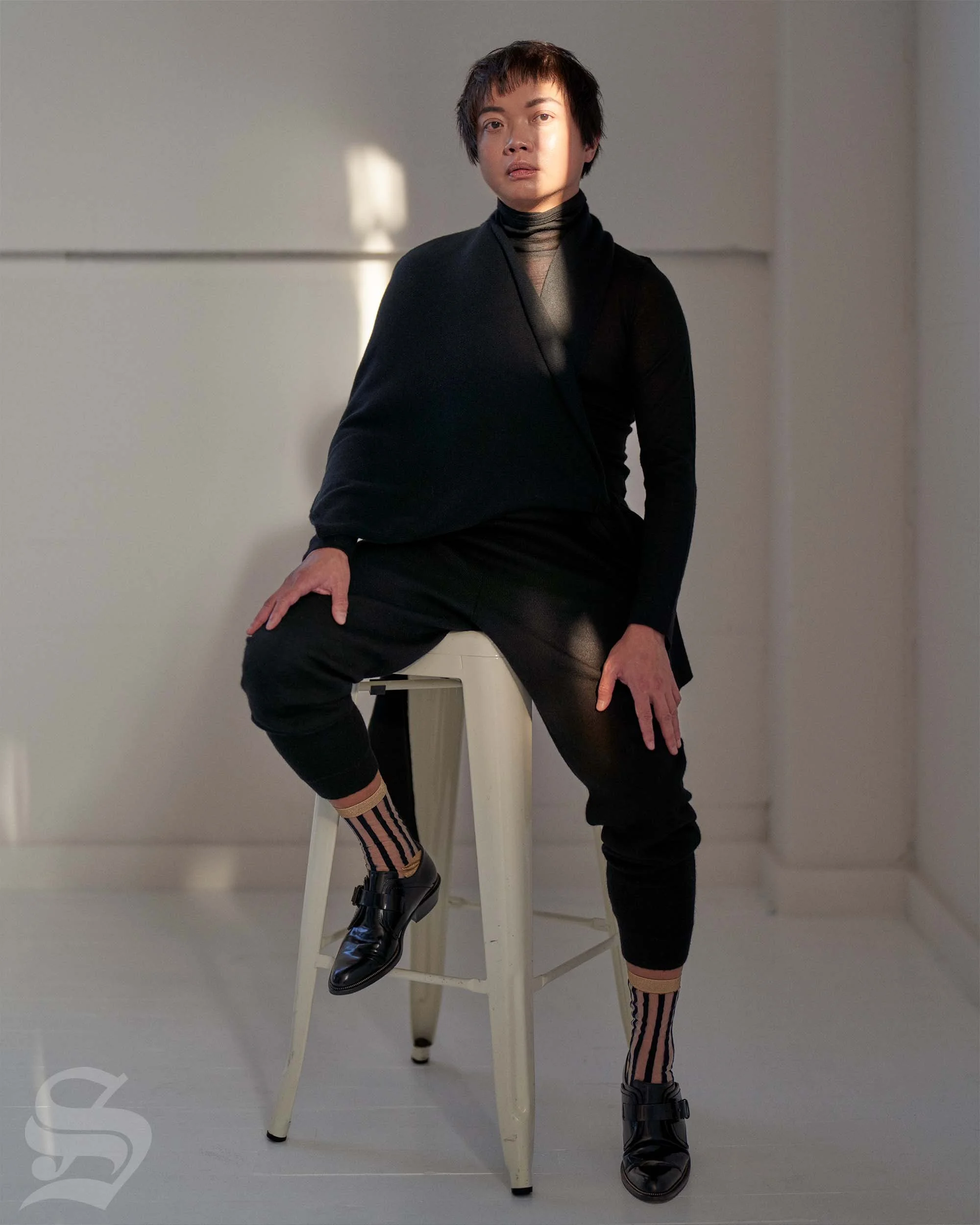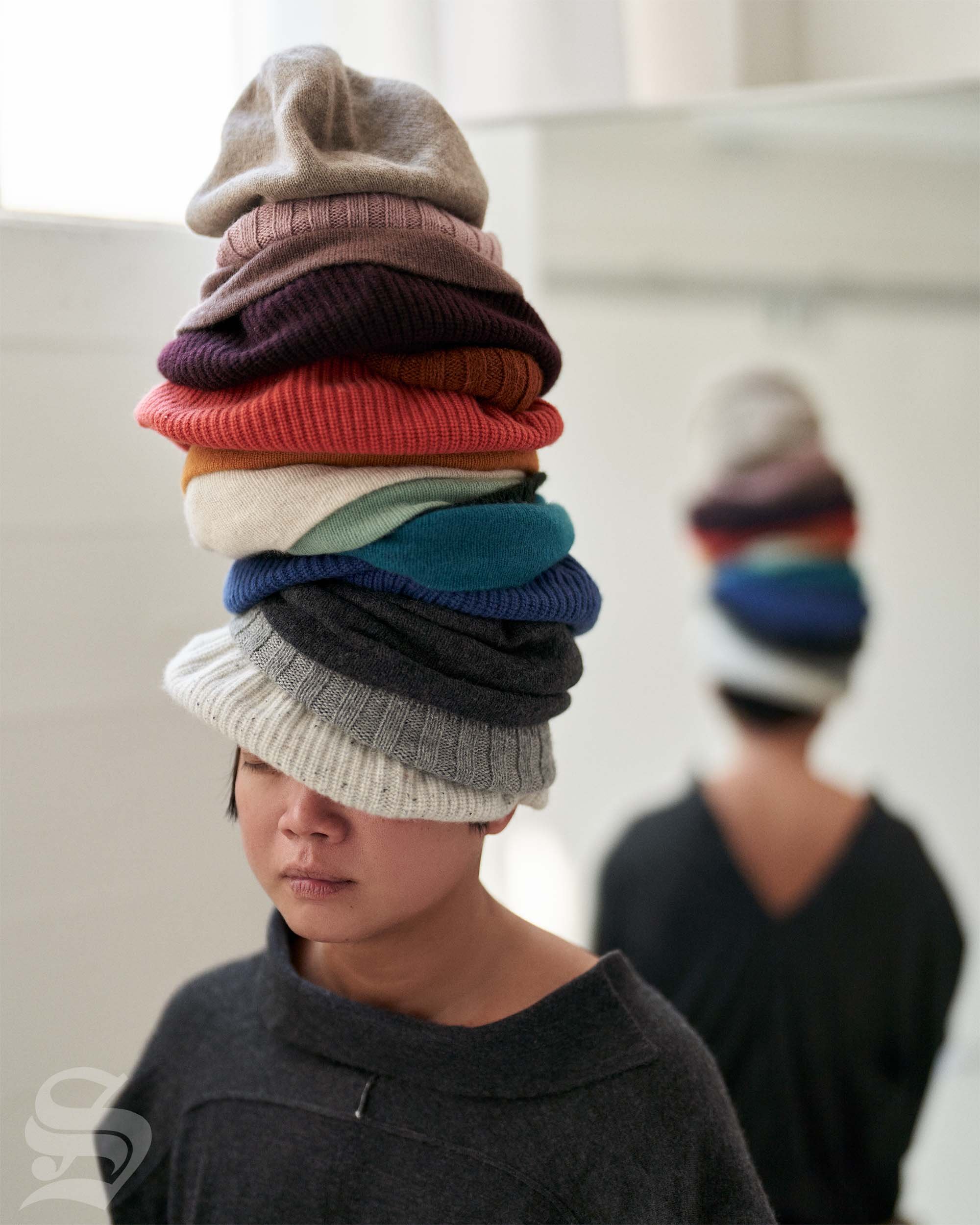How JustCARE Rebuilds Communities
17 min read | Community | A.M.
The following was published in our Winter 2021 Issue and is reprinted here in its entirety. Our interviews with Victor Loo took place throughout 2021 and reflect Victor's involvement with JustCARE addressing the needs of our homeless and unsheltered communities. Fashion styling by Suk Chai. Beauty by Dominique Beauclair. Photography & Story by A.M.
“I just had to do something to help somebody. It is the right thing to do.”
Fashion Integration
For those in King County's public health sector, Victor Loo is a name you're likely to hear on more than one occasion. Victor began a career in fashion with modeling, appearing in major international publications like Numéro known for their cutting-edge conceptual fashion editorials. And from that foundation, Victor built a successful career in behavioral health, choosing to leverage previous fashion platforms and networks to integrate them into the prevailing healthcare conversations.
Now just imagine hearing about a catastrophe. News organizations flood your email inbox, social feeds and airwaves with death counts by the minute. Local and national leaders develop responses that evolve at the speed of incoming data, meeting backlash and suspicion that prolongs needless suffering.
City streets are largely abandoned by citizens and business owners per recommendations given at the gubernatorial level. But the streets aren’t entirely empty. Hundreds of people throughout King County, having weathered an already difficult and freezing winter, homeless and unsheltered, now face a new threat from which they cannot retreat that moves at an exponential rate and wreaks havoc on those already struggling with comorbidities. What do you do?
For Victor Loo, the answer was obvious. Then Director of Practice Innovation at Asian Counseling and Referral Service based in Seattle, Victor’s reaction to the pandemic in early 2020 was to begin reaching out to a network of colleagues and nonprofits in the hopes they could develop a response of their own.
“I had always loved writing grants, so I volunteered to do this two to three times a month for nonprofits that did not have the capacity. People thought I was crazy because I could have charged a lot of money for this and some suggested I was hurting the market by doing this for free. But I just kept thinking these nonprofits don’t have the money and they need help right now.”
THE LONG NIGHT
Early 2020 was a time when hospitals were exceeding capacity and nonprofits everywhere feared losing much needed funding and resources to address the increased workload. Businesses were scaling back hours, reducing inventory and furloughing or laying off significant percentages of their workforce. Many feared losing access to basic amenities including toilet paper and gasoline and began hoarding nonperishable food by the pallet. Store shelves and streets were empty. Even Costco struggled to keep bottled water and fuel in stock.
But these difficulties represent only a part of the story experienced by those fortunate enough to have maintained their employment and a roof over their head. For homeless and unsheltered citizens, there were no lines at Costco, no pallets of green beans, no truck beds filled with bottled water and topped-off gas cans. No one coming to their rescue. Everyday would be like the one before it and the one thereafter in a city too preoccupied with other matters to address their lived experience.
Yet nonprofit organizations in King County are a determined lot whose ranks are filled with diligent and optimistic workers fighting everyday to create a healthier and more caring society. Tell them something is impossible and you might soon learn just how wrong you are. During the beginning of the pandemic in early 2020, it was an impossible idea to design, create, implement, and expand programs that reduced law enforcement involvement while successfully sheltering and providing urgent care for Seattle’s homeless and unsheltered populations. And that was exactly the challenge Victor and many other social service providers worked to overcome.
“I believe Seattle’s public health system is one of the best in the country. I work very close with King County’s Public Health Department and City Council, and over the course of the pandemic, have seen how we’ve taken rapid actions to address our needs. One of our advantages is that our City Council is very progressive in their thinking and have allowed us to become very adaptive and nimble.”
The Coronavirus Aid, Relief, and Economic Security Act (CARES Act) provided much needed funding and resources to local agencies facing the onslaught of cases related to the SARS-CoV-2 outbreak and the COVID-19 pandemic. But while the funding was abundant and accessible, numerous preexisting hurdles made navigating the administrative mazes all the more difficult.
FUNNEL NECK CASHMERE SWEATER : PAYCHI GUH
SHEER MAXI SKIRT : SCHAI
SNEAKERS : STYLIST’S OWN
BABY ALPACA JUMPSUIT AND SEMI-SHEER T-NECK : SSKEIN
CASHMERE SWEATER ACROSS BODY : PAYCHI GUH
OXFORD & SOCKS : STYLIST’S OWN
REIMAGINING COMMUNITY
“Racism and institutional barriers have always existed for the BIPOC and LGBTQ+ communities. We’re the ones who always lack access and have a higher rate of disparity [compared to other communities]. And the pandemic only magnified racism and institutional barriers. Black Lives Matter movement, anti-Asian racism, ongoing anti-LGBTQ+ attacks for decades—the pandemic magnified all of it. But we’ve been very fortunate to live in a city with an overall better infrastructure for healthcare and progressive thinking which has kept us nimble so we can adapt very quickly.”
“As a nation, the BLM movement shows us that there are still many things we can do. Private donations and philanthropy stepped up during the last 18 months to address this disparity. But in Seattle, the biggest issue we face right now is police reform.”
“When I was at ACRS, I helped build the largest pretrial services program in King County, and I actually opened a facility in Kent during the pandemic—which sounds crazy, but when someone says it cannot be done I somehow always say, Then I will be the first. I bring this up because King County is actually thinking about creating more diverse reentry services that are community based rather than using law enforcement, which I support wholeheartedly. If you just put a person in jail, it's a never-ending cycle that cannot reduce recidivism. Sadly, most homeless and unsheltered individuals have chronic mental health and substance use disorder issues, and as a result, go through the revolving door of our current criminal justice system. But our county is now thinking about new and better diversion services and in the future—and I don’t know how long—but we will see less police interactions and more community based diversion approaches. And it doesn’t mean that we don’t need police. It doesn’t mean that we don’t enforce laws. But if it’s something that has to do with behavioral health intervention, a more appropriate method is the use of social service providers.”
“I believe Seattle’s public health system is one of the best in the country.”
TWO-WAY STREET
It’s hard to discuss these topics and not mention KOMO News. KOMO released the documentaries “Seattle is Dying” in 2019 followed by “The Fight for the Soul of Seattle” in 2020. The documentaries—with YouTube views totaling over 14.5 million—covered many aspects of Seattle’s decades-long approach to homeless and unsheltered populations including Seattle’s substance use epidemic and revolving door criminal justice system. These documentaries have been met with sharp criticism from nonprofits and advocates alike.
“I don’t think the report painted a very accurate picture of our homeless and unsheltered communities,” Victor asserts. “There are other elements that simply didn’t get coverage. For example, there are behavioral health organizations that have been trying to use other approaches to respond to our homeless and unsheltered communities during the pandemic in particular."
One such organization is Public Defender Association. According to their website, PDA “advocates for criminal legal system reform and develops alternatives that shift from a punishment paradigm to a system that supports individual and community health.” PDA has been around since 1969 when it was called, “Model Cities program under the name ‘The Defender Association’,” and has been outspoken in their efforts to promote alternatives for our legal system that reduce recidivism and encourage community growth.
CASHMERE BEANIES AND BERETS : PAYCHI GUH
ALPACA BEANIES : Sskein
CASHMERE CARDIGAN : PAYCHI GUH
INFINITY SCARF : SCHAI
MOCK NECK SWEATER : SSKEIN
Trousers : Stylist’s own
JustCARE
At the beginning of the pandemic, Public Defender Association responded to the needs of both homeless and unsheltered communities as well as the criminal justice system as they faced early COVID-19 recommendations that encouraged separating individuals and inmates that showed symptoms of the disease from the general population. To do this, PDA invited a coalition of nonprofits called CoLEAD that made a remarkable connection. According to their website: “It became evident that social distancing, access to sanitation, and shelter in place options in encampments was impossible. Like others, locally and nationally, we realized that hotels were suddenly empty.”
From that starting point, PDA and the CoLEAD teams rolled up their sleeves and began making the impossible, possible.
“Through my involvement with ACRS and my private consulting practice, I came to know about Public Defender Association and they learned about my expertise in behavioral health,” Victor recalls. “So they reached out to me about JustCARE and asked if ACRS was interested in becoming a partner. Of course I was interested. At that time, we were all thinking in terms of catastrophe, so they needed someone to build the program from ground zero.”
JustCARE is the program developed in response to CoLEAD’s successes in Burien. Homeless and unsheltered communities are visited by social workers with intake criteria. Compatible candidates are then given access to temporary shelter in JustCARE facilities where they receive 24/7 support in the form of basic amenities as well as harm reduction and social services. The process of providing emergency and temporary shelter in vacant hotels proved replicable. Cities across Puget Sound contacted PDA hoping to replicate the results in other communities. The stage was set. All they needed were more people willing to step into the limelight.
“I was fortunate to be one of the individuals involved with implementing JustCARE in partnership with the Public Defender Association,” Victor remembers. “I grew up very poor, so I had empathy for those who were homeless and unsheltered during this time. I was never unsheltered, but I remember growing up sleeping on one mattress with my two brothers for several years. Often times my parents had to go hungry so that we could eat. So when we had the opportunity to launch the JustCARE program through [ACRS] I think many people thought I had lost my mind to do something of this magnitude. The program was 24/7 providing behavioral health services for unsheltered clients. I keep using the term unsheltered because it’s an important distinction. When someone is homeless, they might be couch-surfing, in a car, or moving from room to room with relatives and friends. When someone is unsheltered, they don’t have a stable place to live which leads to street encampments or seeking shelter at bus stops and similar structures. So I felt very compelled to do something to address this very real need during the pandemic.”
“we all need to be proactive in thinking about ways to provide meaningful assistance to our most vulnerable populations.”
Throughout their time at ACRS, Victor quickly realized the impact that the events of 2020 left on our underrepresented communities, becoming all the more emboldened to launch JustCARE as soon as possible.
“The majority of our unsheltered clients are from the BIPOC community, many from the Black community, and a large percentage from the LGBTQ+ community. The opportunity I had during the pandemic was to serve in the International District and Pioneer Square because they were some of the hardest hit. I just couldn’t sleep when I saw the conditions people were forced to live in. And after speaking with an individual who was seven months pregnant at the time seeking shelter at a bus stop, she told me that there were no more tents available in the nearby encampment. That image resonated with me, and again, I just couldn’t sleep. So that’s why I committed to a launch window [for JustCARE] as soon as possible. We launched our rapid response using CARES Act relief funds and had services in place in less than three days. I know that one person cannot do it all but I began serving there on top of my other responsibilities for three overnight shifts in a row nonstop from Friday to Sunday. So I was very grateful when my other community members and colleagues stepped forward to help after they saw how this could benefit people and transform their lives.”
Life for unsheltered individuals and families is well documented. But just imagine what a day is like waking up in 40 degree weather after a night sleeping on cold concrete, pregnant, surrounded by others coming down from a midnight high as a form of escapism from an American dream that became a nightmare. You’re at least a mile from a restroom in a time when many businesses are closed to the public. Public port-o-potties are either not serviced or have been removed entirely. What few handouts come your way in the form of cash money is no longer accepted by businesses fearing the spread of a novel (read: not-yet-understood) virus and a national coin shortage. Shelters have been overrun to the point where you’re turned away hours before nightly cutoffs. Hospitals have adopted new protocols and turn away anyone not arriving in an ambulance. You have no phone, no family, and no advocates. And there's nine more hours until sundown.
“With all the uncertainty we have walked through already, I still have concerns about what happens to homeless and unsheltered populations if they would be forced to return to the streets. That’s why I wanted to partner with Public Defender Association, to be very intentional. I met with almost every city council member, the deputy mayor, using my platform through [ACRS] and JustCARE as well as my position on the Seattle LGBTQ+ Commission, to be very intentional and strategic, asking how we can do this together and demonstrate this program was actually very cost-effective. JustCARE was initially supposed to be a three month program for pandemic response but as of today it has been extended through June 2022. So I see a very positive pathway that Seattle city council and King County council will continue to take in their support of this kind of positive work. I’m always thinking about long-term sustainability and June is going to be here in the blink of an eye. So we all need to be proactive in thinking about ways to provide meaningful assistance to our most vulnerable populations.”
“The program’s size is very big requiring a much larger budget than [many nonprofits] can devote to the whole program. To be honest, some agencies do not feel ready for this, but it does not mean that they will not be in the future. But at this time I’m very grateful that Public Defender Association are now housing the JustCARE program, especially since they are the main funder. They’ve even continued to hire me via my private consulting practice so I can continue to build infrastructure, supervision, and oversight during this interim period. The main transition [of the ACRS implementation of JustCARE back to PDA] happened on September 1, 2021. So now we’re looking at how this can become a permanent service to our vulnerable populations.”
INFINITY SCARF : SCHAI
MOCK NECK SWEATER : SSKEIN
FUNNEL NECK SWEATER : PAYCHI GUH
ECLIPSE ARTISAN SHIRTDRESS : SCHAI
COPPER OXFORDS & SOCKS : STYLIST’S OWN
A NEW HOPE
“With the Biden administration, there seems to be focus on taking rapid actions to address the pandemic, which has certainly helped. The ARPA (American Rescue Plan Act) funding has provided a lot for our economic recovery. For King County and City of Seattle, we’ve received significant funding from ARPA but the caveat is that it isn’t long term. Maybe it will last for a year or two. And hopefully there will be some kind of safe lending assistance for businesses to gain an economic cushion as we try to stabilize our local economy. But ultimately we all need a sustainability plan that will guarantee we can all move forward successfully.”
“In King County, we have a Health Through Housing initiative where we’ve purchased eight hotels to support people getting off the streets. The hotel model is particularly helpful for many reasons, but also that it’s actually cheaper to buy a hotel than place people in apartments. And it’s not meant to be permanent housing. It’s a bridge, similar to the JustCARE program, intended to bring stability so individuals and families can move on into a more permanent solution. So I’m grateful our city and council are progressive, and I think, quite bold, because you really have to have guts to do something like this, especially considering the potential impact of police reform.”
“At the JustCARE hotels I have worked at, there are zero 911 calls. When I share this with the City Council, they almost don’t believe me. And we also reduce the amount of time a client requires urgent care or visits the emergency room because we prevent people from overdosing, having violent psychotic episodes, and generally requiring emergency attention. So I see a future with more community-based approaches and less law enforcement.”
In May 2021, Victor left ACRS to accept a new role as President & CEO of Seattle Counseling Service which provides a broad range of outreach and preventative care services including behavioral health and substance use disorder counseling to our LGBTQ+ community. Having been founded in 1969, SCS is the oldest organization of its kind in Washington State.
“As a social services and behavioral health organization, [SCS responds] to community needs. That’s why substance use disorder programs, IRUO (Immigrant, Refugee, Undocumented Outreach), NEON (Needle and Sex Education Outreach Network), HASAP (Hepatitis AIDS Substance Abuse Program) and others were developed. With an integrated healthcare system, gradually the country will move toward providing both primary medical care and behavioral health care. Not every [organization] is doing that right now, but it’s definitely the pathway SCS will explore in the future. ACRS is already ahead of it by offering primary care services and I’m working with our staff here to build that pathway.”
“Without strong financial health, you cannot do the scope of work that you want to do.”
NEXT STEPS
“I see my role at SCS as one of intentionality. I would say my primary goal right now is stabilizing our organization because the pandemic has caused a lot of financial stressors for so many businesses which directly affects social services. So I knew there would be challenges ahead. I would like to grow things here, it would being me joy. But before we can create new programs and expand, the stabilization of our existing framework is of primary importance. Without strong financial health, you cannot do the scope of work that you want to do.”
“Another component is that the mental health and substance use disorder programs are funded primarily by MIDD (King County’s Mental Illness and Drug Dependency fund) which is generated through our local sales tax dollars. I was appointed to serve on the MIDD advisory committee, so I represent [according to King County’s website] 'Culturally Specific Mental Health Services Provider.' I often turn down invitations to serve on committees, but in this case, how they address behavioral health, substance use, criminal justice, and homelessness issues, I’m able to advise King County council members on strategies and ways of thinking about issues that can actually benefit others—especially those without insurance, Medicaid, or who completely lack resources. I think MIDD is an amazing thing King County has, and because funds are generated by 0.1% sales tax, there were concerns about decreased funding as a direct result of our pandemic economic conditions. But we actually saw the local sales tax revenue increase, so the committee is now looking at a restoration of a budget that had been cut, leading to more and better services moving forward. And while I don’t have a crystal ball, I can see that, with ARPA and MIDD funding, we are slowly rebuilding our economic stability so we can resolve issues within our homeless and unsheltered communities hopefully for years to come. And it will take a long time. You cannot cure these issues overnight.”
“But I see myself as very fortunate. I would be lying if I said I wasn’t ambitious, because I believe I am. And part of this is due to my modeling career and the intentional branding that has allowed my name to come up in conversations with people who have helped connect me with those who might benefit from my expertise. But I firmly believe in sharing resources and community building because truly no one can do these very big things alone. There may be organizations that keep lobbying for resources and do not want to share them, but I am the complete opposite. I really believe we are stronger together. And by sharing resources, we elevate everyone together. Leadership happens at every level. A person does not need to be a president or CEO to have a leadership role. And while not everyone is cut out for leadership, we will all need help at some point in our lives and building better communities is something we can all do to make a real impact.”
“The JustCARE program is easily one of the hardest things I have ever been involved with. I’ve implemented many programs in my life, but never anything so quickly. I honestly don’t know how I did it, whether it was stubbornness or motivation, but I just knew that the longer I delayed the more individuals would suffer in encampments. I just had to do something to help somebody. It is the right thing to do. Why would I delay?”
COLUMN SURI ALPACA COAT : SCHAI
CASHMERE CARDIGAN : PAYCHI GUH
VINTAGE TROUSERS & SNEAKERS : STYLIST’S OWN
“we will all need help at some point in our lives and building better communities is something we can all do to make a real impact.”












